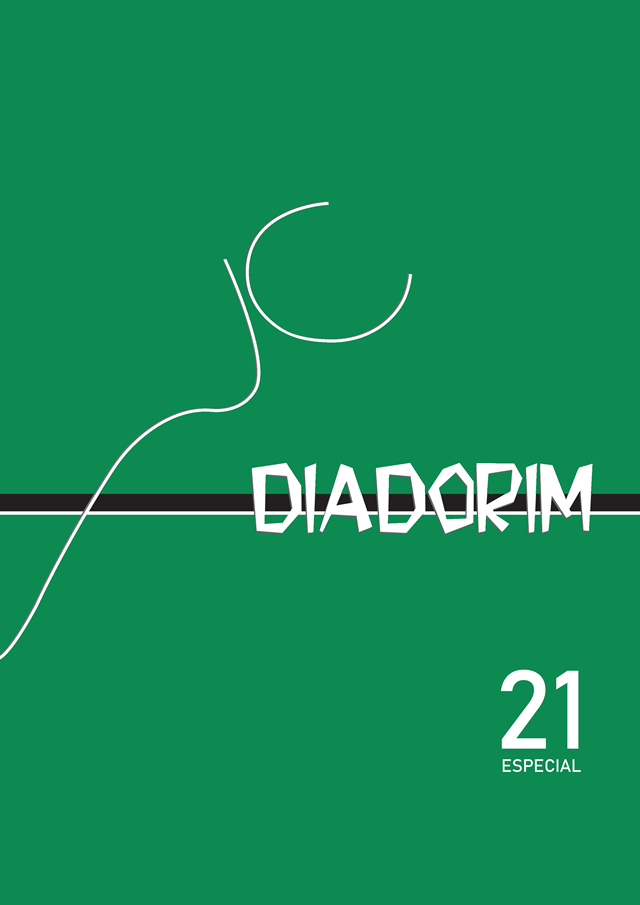Obscene voices in eighteenth-century portuguese poetry
DOI :
https://doi.org/10.35520/diadorim.2019.v21nEspa29086Mots-clés :
obscenity, desire, poetry, power, class,Résumé
Abstract:
This study offers a rereading of the obscene verse in Portuguese poetry in the second half of the 18th-century. The main goal is to integrate a poetics of obscenity not only in the classical heritage, as has been pointed out by literary criticism (CIDADE, 1986; PIRES, 2004; NEUMANN, 2006), or more overtly by studies of rhetoric-stylistic content (PÉCORA, 2011), but to understand this singular production, largely ignored within the academy, within the broad context of the social and cultural uses of the verse. This line of interpretation also situates obscene poetry in two converging contexts, which we consider decisive for its analysis. This writing occurs at a time when the very modern concept of lyric poetry, as expressive and subjective capital, was in formation. at the same time, the obscene is related to the protocols of truth and concealment promoted by the secular process opened by the Enlightenment, thus having a profound relationship with the transformations that occur in Portuguese society in the last decades of the 18th-century.
Références
ALMANSI, G. L’Estetica dell’Osceno. Per una letteratura ‘carnalista’, Torino: Einaudi, 1996.
BATAILLE, G., O Erotismo, Lisboa: Antígona, 1988.
BOCAGE, M. M. B. Obra Completa, Edição de Daniel Pires, vols. I, II e VII, Porto: Edições
Caixotim, 2004-2005.
BOURDIEU, P. As Regras da Arte, Lisboa: Presença, 1996.
CARVALHO, António Joaquim, Obras Poeticas, Jocosas, e Sérias, tomo I, Lisboa: Impressão Regia, 1806.
---- Obras Poeticas, Jocosas, e Sérias Lisboa, tomo II: Nova Of. de João Rodrigues Neves, 1807.
CARVALHO, António Lobo, Poesias Joviaes e Satyricas, Cadix, 1852.
CIDADE, H. Lições de Cultura e Literatura Portuguesas, 2º vol., Coimbra: Coimbra Editora. 1984.
---- Bocage, Lisboa: Presença, 1986.
CORREIA, N. Antologia de Poesia Portuguesa Erótica e Satírica, Seleção,
Prefácio e Notas de Natália Correia, Lisboa: Antígona-Frenesi, 1999.
DARNTON, R. The Forbidden Best-Sellers of Pre-Revolutionary France, London/NY:
W.W. Norton, 1995.
FOUCAULT, M. História da Sexualidade, vols. 3, Lisboa: Relógio d’Água, 1994.
---- A Ordem do Discurso, Lisboa Relógio d’Água, 1997.
FLOCH, S. L’Obscène. Université de Pau et des Pays de l’Adour: Faculté de Lettres, 1983.
HATHERLY, H. «Freiráticos e Antifreiráticos. Os Amantes Libertinos da época barroca»,
in: Poesia Incurável. Aspectos da Sensibilidade Barroca, Lisboa: Editorial Estampa, 2003,
pp. 299-338.
HÖFNER, E. «Anthropologie und Epistemologie der Erotik im XVIII. Jahrhundert: Zur ’Poesia erótica’ des Manuel Maria Barbosa du Bocage», In: Neumann, 2006: 79-135.
MAFFRE, Cl. (Ed.) L’Oeuvre satirique de Nicolau Tolentino, Edição de Claude Maffre,
Paris: Centre Culturel Calouste Gulbenkian, 1994.
MARTINS, M. A Censura Literária em Portugal nos Séculos XVII e XVIII, Dissertação de
Doutoramento: Universidade Nova de Lisboa, 2001.
NEUMANN, M. (Ed.) Zwischen allen Stühlen. Manuel Maria de Barbosa du Bocage.
Akten des Kolloquiums zum 200. Todesjahr des Dichters. Hamburg, 20-22 Juni 2005, Bonn,
Romanischer Verlag, 2006.
NYS, F. J. As Fontes Francesas das “Cartas de Olinda e Alzira” de Bocage, Braga, Centro
de Estudos Humanísticos: Universidade do Minho, 2005.
OLIVEIRA, F. M. Poesia e Metromania. Inscrições Setecentistas (1750-1820), Dissertação de Doutoramento, Coimbra: Faculdade de Letras da Universidade de Coimbra, 2008.
PATTERSON, A. Censorship and Interpretation. The Conditions of Writing and Reading in Modern England. Madison/Wisconsin: The University of Wisconsin Press, 1989.
PÉCORA, A. Máquina de Géneros, São Paulo: EDUSP, 2001.
STEINTRAGER, J. «”Are You there yet?”: libertinage and the semantics of the orgasm», in Differences, 1999, Nº 11, vol. 2, pp. 23-51.
TOLENTINO [de Almeida], Nicolau Obras de Nicolau Tolentino de Almeida, Prefácio de
Alexandre O'Neill, Lisboa: Estúdios Cor, 1968.
---- L’Oeuvre satirique de Nicolau Tolentino, Edição de Claude Maffre, Paris, Centre
Culturel Calouste Gulbenkian, 1994.
Téléchargements
Publiée
Numéro
Rubrique
Licence
Transferência de direitos autorais - Autorização para publicação
Caso o artigo submetido seja aprovado para publicação, já fica acordado que o autor autoriza a UFRJ a reproduzi-lo e publicá-lo na Diadorim: Revista de Estudos Linguísticos e Literários, entendendo-se os termos "reprodução" e "publicação" conforme definição respectivamente dos incisos VI e I do artigo 5° da Lei 9610/98. O artigo poderá ser acessado pela internet, a título gratuito, para consulta e reprodução de exemplar do artigo para uso próprio de quem a consulta. Essa autorização de publicação não tem limitação de tempo, ficando a UFRJ responsável pela manutenção da identificação do autor do artigo.

A Revista Diadorim utiliza uma Licença Creative Commons Atribuição-NãoComercial 4.0 Internacional (CC BY-NC 4.0).

